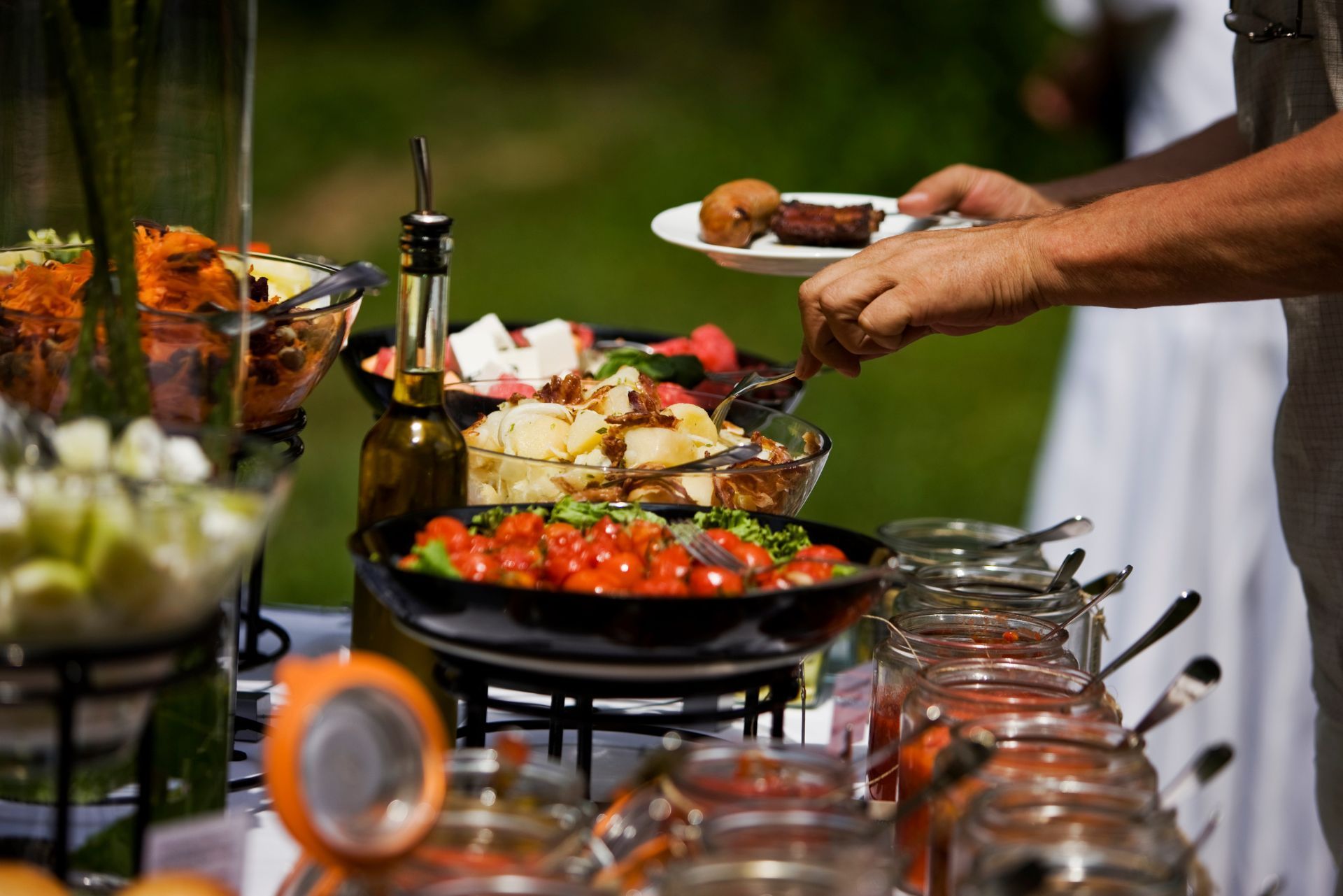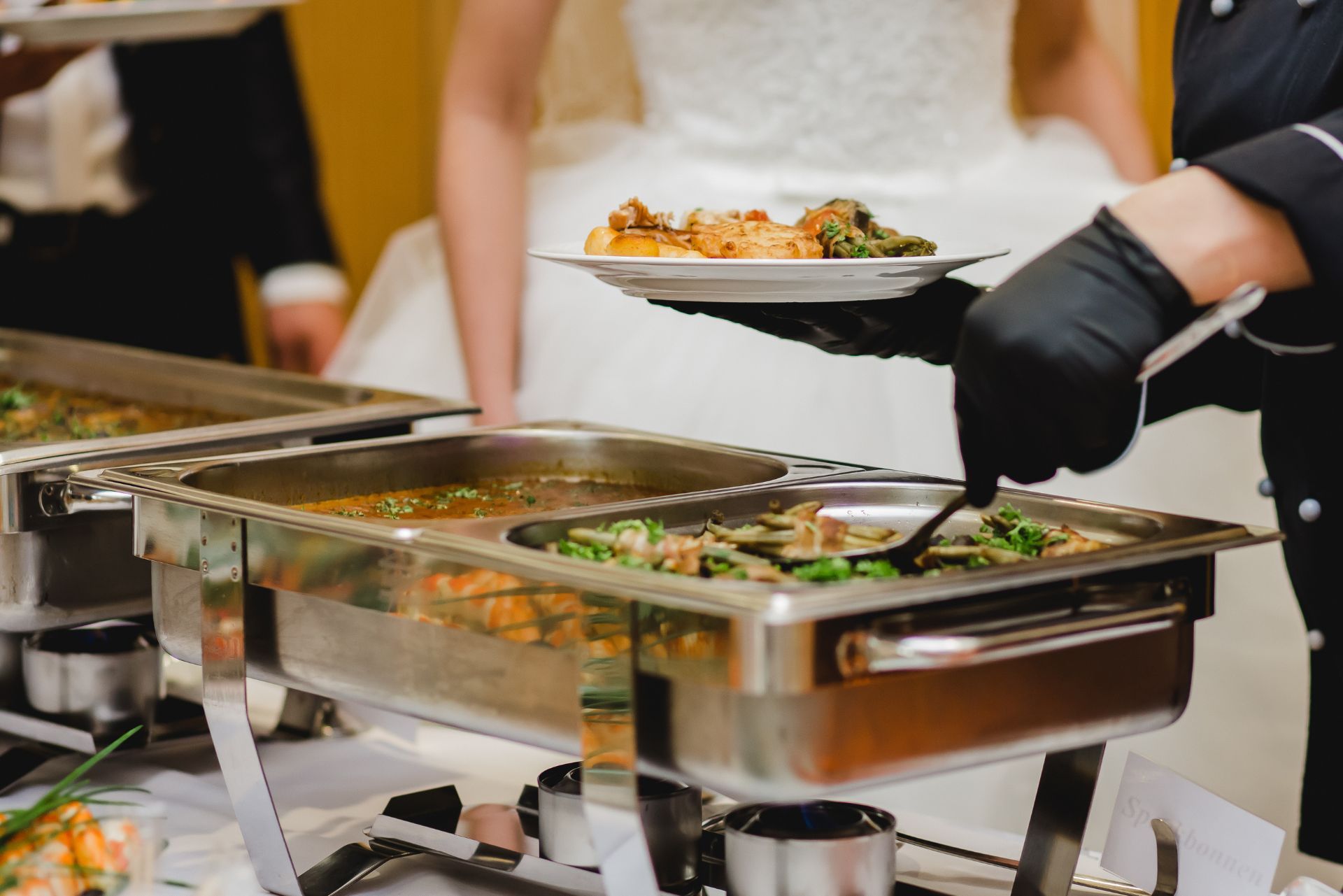Top 3 Recommended Policies

By: Lance Hale
Licensed Commercial Insurance Specialist
425-320-4280
Catering continues to be one of Washington’s most dynamic service industries, fuelled by a booming events market that stretches from tech-heavy Seattle conferences to vineyard weddings in the Yakima Valley. Yet every banquet carries a mix of culinary creativity and financial risk. One food-borne illness outbreak, a toppled chafing dish, or a delivery van accident can erase months of profits overnight. Comprehensive insurance tailored to Washington caterers is the safety net that keeps businesses serving guests with confidence. The following guide walks through the coverages, regulations, costs and best practices that matter most in the Evergreen State.
Why Insurance Matters More Than Ever For Washington Caterers
Washington’s catering sector has grown by more than 25 % in the last decade, and the Department of Revenue counted roughly 1,700 registered catering companies in 2023. Growth brings opportunity, but also exposure. According to the Insurance Information Institute, the average general liability claim for food businesses nationwide tops $35,000, while product liability payouts linked to food contamination can exceed $100,000. Such figures easily dwarf the average caterer’s monthly gross revenue, illustrating why a robust insurance program is not a luxury but an operational necessity.
Beyond financial protection, insurance provides credibility. Corporate clients, wedding planners, and government agencies increasingly demand certificates of insurance before signing a contract. A well-structured policy portfolio therefore doubles as a marketing asset, proving to prospects that the caterer is professional, stable, and prepared for contingencies.
Moreover, the unique nature of catering operations—often involving off-site events, diverse venues, and a variety of food handling practices—adds layers of complexity that make insurance even more critical. For instance, catering businesses must navigate the intricacies of food safety regulations, which can vary significantly from one jurisdiction to another. A single misstep could lead to foodborne illness claims that not only threaten financial stability but also damage a caterer's reputation. Therefore, having the right insurance coverage tailored to these specific risks is essential for safeguarding both the business and its clients.
Additionally, as the catering industry becomes more competitive, the ability to showcase comprehensive insurance coverage can serve as a differentiator in a crowded market. Caterers who invest in insurance not only protect their assets but also enhance their appeal to potential clients who prioritize safety and reliability. This proactive approach can lead to increased trust and long-term relationships with clients, ultimately contributing to sustained growth in a rapidly evolving industry landscape.
Regulatory Landscape: What Washington Law Requires
Business Registration And Food Service Licensing
All caterers operating in Washington must possess a Unified Business Identifier (UBI) number, obtained during business registration with the Secretary of State or Department of Revenue. In addition, a catering license or endorsement is required from the local county health department. Failure to maintain an active license can void certain insurance provisions or even trigger policy cancellation. It’s also important to note that each county may have its own specific requirements and regulations, which can include health inspections, food handling procedures, and even zoning laws that dictate where catering businesses can operate. Therefore, it is crucial for caterers to stay informed about local ordinances and ensure compliance to avoid potential legal issues.
Food Worker Cards And Manager Certification
Every employee who handles food must hold a valid Washington Food Worker Card obtained after approved training. Many insurers now request evidence of at least one certified food protection manager on staff when underwriting general and product liability limits. Demonstrating compliance can unlock premium credits of 5 – 10 % under some carriers’ loss-prevention incentives. Additionally, the training for these certifications often includes essential topics such as safe food storage, personal hygiene, and allergen awareness, which not only help in meeting regulatory requirements but also enhance the overall safety and quality of the food being served. By investing in comprehensive training for their staff, caterers can foster a culture of safety and professionalism that resonates well with clients and can lead to repeat business.
Workers’ Compensation Mandate
Washington operates a monopolistic workers’ compensation system through the Department of Labor & Industries (L&I). Private insurers cannot sell statutory workers’ compensation within the state, so caterers must register and report payroll to L&I. Failure to do so exposes owners to fines and personal liability for on-the-job injuries. This system is designed to provide benefits to workers injured on the job, which can include medical expenses and wage replacement. Caterers should also be aware of the importance of maintaining a safe working environment, as a history of workplace injuries can lead to increased premiums and scrutiny from L&I. Implementing safety training programs and conducting regular safety audits can significantly mitigate risks and foster a safer workplace for all employees.
Core Insurance Policies Every Washington Caterer Needs
While each operation is unique, six primary coverages form the backbone of a sound risk-transfer strategy for caterers across Washington.
General Liability
General liability (GL) protects against third-party bodily injury and property damage occurring during catering activities. Picture a guest tripping over an extension cord at Seattle’s Museum of Pop Culture during a buffet setup. GL covers medical costs, legal defence and potential settlements. Most venues require at least $1 million per occurrence, yet high-profile event spaces often request $2 million limits. Additionally, GL can also protect against claims of slander or libel, which can arise in the age of social media where a single negative review can escalate into a public relations crisis. This makes GL not just a safety net for physical incidents, but a crucial component of a caterer's overall reputation management strategy.
Product Liability
Although typically bundled with GL, product liability deserves special mention. It responds when served food causes illness or allergic reaction. Washington’s 2021 Department of Health report logged more than 190 food-borne illness outbreaks, 14% of which traced back to catered events. An endorsement may broaden coverage for spoilage during transit or off-site storage. Furthermore, as dietary preferences and restrictions become more prevalent, caterers must be vigilant about cross-contamination and accurate labeling of allergens. This not only protects the health of guests but also shields the business from potential lawsuits stemming from food-related incidents.
Commercial Auto
From cargo vans hauling Cambros to box trucks loaded with rental equipment, vehicles are the arteries of a catering business. Commercial auto insurance addresses collision damage, liability for roadway accidents and—importantly in densely populated Puget Sound—uninsured motorists. State minimums sit at $25,000 bodily injury per person, but most commercial contracts stipulate limits of $1 million combined single limit (CSL). Additionally, it’s wise for caterers to consider coverage for equipment theft or damage while in transit, as the loss of essential tools can severely disrupt operations and lead to costly delays.
Liquor Liability
Serving alcohol in Washington requires a Class 13 or Class 12 MAST permit and compliance with the Liquor & Cannabis Board (LCB). A separate liquor liability policy, or special event endorsement, covers claims stemming from intoxicated guests—such as a DUI accident after a Woodinville winery reception. Courts have increasingly held servers liable under Washington’s dram shop laws, so liquor liability is essential whenever alcohol is present. Furthermore, caterers should implement responsible serving practices and training for staff to mitigate risks associated with alcohol service, as this not only protects the business but also promotes a safe and enjoyable environment for guests.
Workers’ Compensation (L&I)
As noted earlier, workers’ compensation in Washington is administered by the state. Coverage pays wage replacement and medical benefits if an employee slips on a greasy kitchen floor or suffers a burn. Insurers sell “stop-gap” endorsements to close employer liability gaps that the monopolistic system does not address, protecting the company from lawsuits alleging negligence. Furthermore, investing in safety training and ergonomic assessments can reduce workplace injuries, ultimately leading to lower insurance premiums and a healthier work environment. This proactive approach not only safeguards employees but also enhances overall productivity.
Property Insurance Or Business Owners Policy (BOP)
Whether operating from a commissary kitchen in Spokane or a leased storefront in Tacoma, caterers need property insurance for ovens, refrigeration, small wares and office electronics. A BOP packages this with GL at a discounted rate. Look for endorsements covering food spoilage resulting from utility outages—an all-too-common issue during coastal storm season. Additionally, consider coverage for business interruption, which can provide financial support in the event of a disaster that temporarily halts operations. This ensures that even in the face of unforeseen challenges, a catering business can maintain its financial stability and continue to serve its clients effectively.

Optional And Emerging Coverages To Consider
Risk evolves, and so do insurance products. The following additions can close critical gaps.
Event Cancellation And Weather Insurance
Pacific Northwest forecasts are famously fickle. Event cancellation coverage reimburses lost revenue and extra expenses if snow, wildfire smoke or a public health order forces last-minute postponement. Some insurers even offer parametric weather products that pay out automatically when rainfall or temperature thresholds are met. This can be particularly beneficial for outdoor events, where the unpredictability of weather can lead to significant financial losses. For instance, a wedding planned in a scenic outdoor venue may face cancellation due to unexpected rain, and having this coverage ensures that the couple can recover their costs and reallocate funds to reschedule their special day. Furthermore, as climate change continues to impact weather patterns, the importance of such insurance products is likely to grow, making it a wise consideration for event planners and businesses alike.
Cyber Liability
Online ordering platforms and mobile point-of-sale systems expose sensitive customer data. A 2022 Verizon Data Breach Investigation revealed that 61 % of incidents in hospitality involve payment card skimming. Cyber liability pays for notification costs, forensic analysis, credit monitoring and third-party suits, offering peace of mind in a digital landscape. As more consumers turn to digital transactions, the potential for cyber threats increases, making it crucial for businesses to protect themselves. Additionally, the reputational damage from a data breach can be long-lasting, affecting customer trust and loyalty. Cyber liability insurance not only covers the immediate financial repercussions but also helps businesses implement better security measures and respond effectively to breaches, ensuring they are better prepared for future incidents.
Equipment Breakdown
Standard property policies often exclude mechanical failure. Equipment breakdown coverage steps in when a compressor seizes or a convection oven’s control board shorts, covering repair costs and sometimes business interruption losses. This coverage is especially vital for businesses that rely heavily on specialized equipment, such as restaurants or manufacturing facilities, where a single malfunction can halt operations and lead to significant revenue loss. Moreover, this type of insurance can also cover the costs associated with the loss of perishable goods, which can be a critical concern for food service establishments. By investing in equipment breakdown coverage, businesses can maintain smoother operations and ensure they are equipped to handle unexpected mechanical failures without suffering devastating financial consequences.
What Washington Caterers Typically Pay And Why
Premiums hinge on revenue, payroll, claims history, menu risk profile and event locations. Broad statewide surveys conducted by a leading insurance market research firm in 2023 produced the following averages for caterers with annual sales under $2 million:
- General & product liability ($1 m/$2 m limits): $850 – $1,600 per year
- Commercial auto (one light-duty van): $1,200 – $2,000 per year
- BOP including property ($50,000 limits): $1,000 – $1,800 per year
- Liquor liability (when applicable): $400 – $900 per event or $1,500 – $3,000 annually
Businesses hosting high-risk cuisines like raw oysters, or specialising in large festivals, often see surcharges of 10 – 20 %. Conversely, documented food-safety training, auto telematics and claim-free tenure can all secure meaningful discounts.
Real-World Claim Scenarios From Washington Caterers
Cross-Contamination At A Corporate Luncheon
In Bellevue, 24 guests suffered salmonella after cooked chicken trays briefly rested on a raw-poultry prep table. Medical bills and reputation management costs totalled nearly $88,000. The caterer’s product liability coverage shouldered the expenses and funded a crisis-communications consultant.
Delivery Van Collision On I-5
A southbound box truck rear-ended the caterer’s van en route to a Tacoma convention center. Two staff members sustained whiplash and the vehicle was declared a total loss. Commercial auto and workers’ compensation worked in tandem: the auto policy covered the van and liability, while L&I administered medical benefits.
Alcohol-Related Injury At A Winery Wedding
After consuming several signature cocktails, a guest stumbled into a decorative fire pit, suffering second-degree burns. Despite the winery’s own insurance, the plaintiff also named the catering company in the lawsuit. The caterer’s liquor liability policy settled the claim for $72,000, avoiding protracted litigation.

How To Select The Right Broker And Carrier
Washington’s insurance marketplace includes both national insurers and mutual companies headquartered in the Pacific Northwest. Partnering with a broker familiar with hospitality exposures ensures nuanced coverage wording and informed carrier selection. When vetting advisors, caterers should ask about:
- Number of catering or restaurant clients on the agency’s books
- Claims advocacy resources and average response times
- Access to specialty programs offering food-specific endorsements
- Certificate issuance workflows—crucial when venues demand proof within hours
A broker that pairs strong industry knowledge with digital service—online cert requests, mobile apps, and clear renewal timelines—will add value far beyond basic policy placement.
Risk Management Practices That Keep Premiums In Check
Rigorous Food Safety Training
Regular ServSafe courses, documented quarterly refresher sessions, and clear allergen-labeling protocols not only protect patrons but also act as bargaining chips during policy renewal. Some insurers now send loss-control consultants to observe food handling and pass along premium credits for stellar results.
Preventive Equipment Maintenance
Breakdowns cause both spoilage and schedule chaos. A maintenance log for coolers, ovens and generators demonstrates professionalism and provides evidence that equipment breakdown incidents were truly unforeseen—helpful when filing a claim.
Contractual Risk Transfer And Waivers
Well-drafted contracts shift certain liabilities back to venues, rental companies or corporate clients. Legal counsel can draft hold-harmless clauses, while an insurance broker ensures the clauses align with the caterer’s policy language. Proper transfer reduces overall loss frequency, thus stabilising premium costs.
Conclusion
From licensing rules to cutting-edge cyber policies, Washington caterer insurance involves multiple moving parts—much like a flawlessly timed service. Businesses that proactively assemble the right mix of coverage, maintain regulatory compliance, and champion safety practices safeguard both their balance sheets and their reputations. The result is freedom to focus on what matters most: creating memorable culinary experiences for clients across the Evergreen State.

